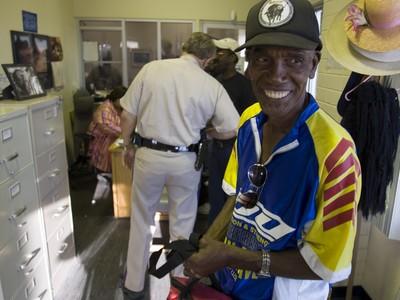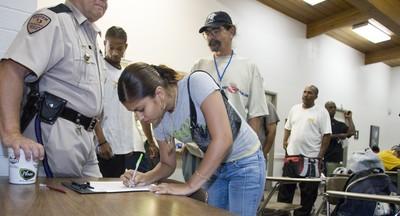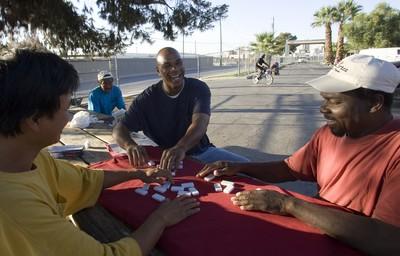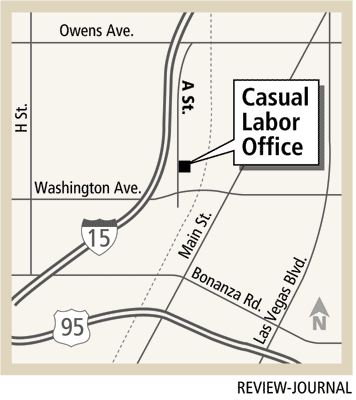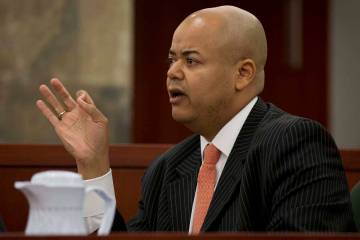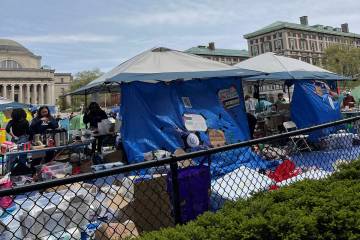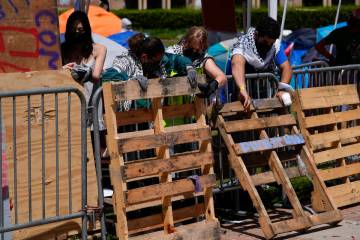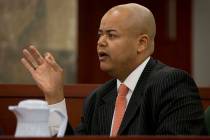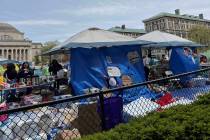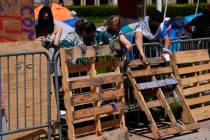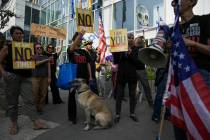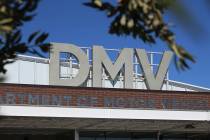Working day to day
Zaskya DeLeon is not your typical day laborer.
But the petite 22-year-old seemed perfectly at home early one weekday morning as she lined up with dozens of mostly down-on-their-luck men looking to score a few hours' work at the Casual Labor Office.
She shook her head when asked whether she was nervous about being picked up by a total stranger for a day's employment.
"That's why I'm here," said DeLeon's nearby boyfriend, 21-year-old Jeff Ellens.
The couple was hoping to make some extra money to help them move out of a friend's place and into their own apartment.
Like many who frequent the downtown temporary employment office run by the state, DeLeon and Ellens are "between places," euphemistically speaking.
The Casual Labor Office draws many of its dozens of daily workers from among the homeless in downtown's "homeless corridor." The recently laid-off or those looking to supplement their incomes with an occasional second job also are frequent visitors, according to office staffers.
What you won't usually find at the office at 1001 A St. are many of the dozens of mostly Hispanic day laborers who line valley streets near home improvement stores and nurseries each morning.
That's because the office asks workers whether they are U.S. citizens. If the answer is no, workers are asked to show their authorization to work in the United States.
Those who are in the country illegally, or otherwise want to fly under the radar, tend to steer clear of such places, said Ron Fletcher, Southern Nevada's chief of field direction and management for the state's Department of Employment, Training and Rehabilitation.
The difference is underscored by some of the day laborers who frequent the Casual Labor Office.
"Word just needs to get out that there's workers here -- documented workers, U.S. citizens," said 57-year-old Lawrence Taylor as he sat outside the office eating his breakfast, a bowl of lasagna donated by a church.
Taylor, who said he lives in a homeless shelter operated by Catholic Charities of Southern Nevada, wishes more employers would hire workers from the office rather than picking them up on the street.
"It's been slow," he said, adding that lately he's been getting work only about one day per week.
Mel Hadfield, the office's manager, also wants word to spread.
"Some days, there are no jobs," Hadfield said. "Our system does work, when employers know about it."
Hadfield said the office already works with hundreds of employers, but is always looking for more at which to place the 30 to 50 workers who visit the office each day.
The Casual Labor Office, which has been around about 30 years, matches workers with employers needing help with a number of odd jobs, from assisting movers and warehouse work to landscaping and construction.
It received some extra attention recently after Las Vegas Mayor Oscar Goodman floated the idea of requiring people to get a $5 permit to hire day laborers off the street.
Goodman quickly backed away from the proposal, but noted that city and other Southern Nevada officials have been exploring the idea of creating a center -- much like that already extant in the Casual Labor Office -- where day laborers could go to seek work rather than standing on the street.
Businesses complain about the workers congregating outside, littering and harassing customers. Police also deal with complaints about the workers, and sometimes cite or arrest them for trespassing.
The idea of opening a work center for such laborers has been bandied about regionally for the past few years. The strategy is one that dozens of U.S. communities have tried with varying success.
But in order to get many workers off the streets and into a center, it would have to welcome illegal immigrants.
The idea of using tax dollars to fund a center that would help such workers find jobs could be a political minefield.
Talks about opening such a center previously were stymied because of questions about how it would be funded, where it would be located and who would operate it.
"It was a perfectly sensible conversation about ways to address these issues, which foundered I believe for purely political reasons," said Gary Peck, executive director of the American Civil Liberties Union of Nevada.
Fletcher said no discussion has been held at the state level of easing requirements for workers who frequent the Casual Labor Office to allow undocumented workers a chance for temporary employment there.
At the office each morning, workers are asked to give their names and Social Security numbers.
The workers sign in and draw numbers from a cup. The numbers represent in which order the workers are sent out on jobs.
The office opens at 6 a.m. and closes at 3 p.m. each weekday. By about 8 o'clock on a recent morning, six workers had been handed bus passes and sent out for a job installing advertising placards atop taxicabs.
The men received a quick pep talk from Hadfield as they headed out the door.
"Sell yourselves, and don't sell yourselves short," he told them.
A seventh man had been sent to a nearby home to help an elderly woman clean out her storage shed.
DeLeon, who had drawn number 37 in the day's lottery, began to lose hope that she would find work for the day. She and her boyfriend waited under a shade tree. A group of men sat around nearby picnic tables playing dominos, reading or sipping cans of beer.
"It fits me pretty good," said 67-year-old Aaron Smith, who picks up occasional work to supplement his Social Security income. "I don't want to be pinned down to one job. I like the variety."
Smith said he sometimes stays at the St. Vincent homeless shelter. Other times, he's able to afford a cheap motel room.
"I run out of money at the end of the month," he said, smiling. "Only because I gamble."
When hired, workers receive an average hourly rate of $7 to $10. They say they feel safer getting jobs from the office than they do standing on the street.
"When you are just standing around, law enforcement doesn't take too kindly to you," said Darvell Holder, who has been using the office to find work off and on for about three years.
Workers who wait along valley streets for day labor gigs often complain that they are harassed by the police while simply standing on public sidewalks.
Darvell said the office also is preferable because it provides bus passes and maps for workers to get to their jobs.
"This is the right way to do it," he said.
Hadfield and Fletcher said using a day labor center is safer for everyone concerned, because employers must fill out job orders and office staffers know the workers well.
"I know who's getting in your vehicle, and I know whose vehicle you're getting into," Hadfield said. "It's insurance for both the worker and the employer."



